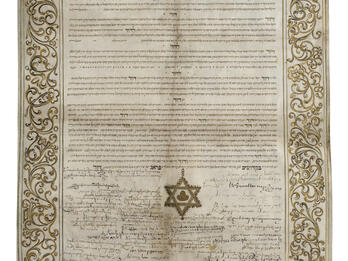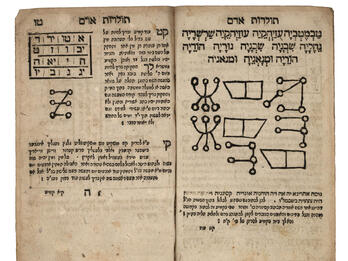Me’ah she‘arim (A Hundred Gates)
Fifth Gate
After we have proved that it is more suitable for man to be careful with the rational commandments than with all other types of commandments, we must say that this exalted commandment, i.e., the commandment of honoring one’s father and mother, with which we are dealing in this composition, is one of the rational commandments. Moreover, it is a foundation, a root, and a basis for all the rational commandments, and it is a touchstone and foundation stone for all of them. Out of it comes forth the cornerstone, out of it the tent peg (see Zechariah 10:4), and by way of it and because of it, all of Israel earns merit in the service of the Lord and fear of heaven, and by way of it, Israel earns merit in the way of the world [good social behavior] and in political behavior.
For the impulse of man’s heart is evil from his youth (Genesis 8:21), and he follows after the nature of the material and bodily desires, and all the impulse of the thoughts of his heart are only evil continually (Genesis 6:5). And if it were not for a man’s parents, who guide him slowly, slowly, here a little, and there a little (Isaiah 28:10, 13), concerning the commandments and good deeds and the way of the world, he would be one who denies the fundamental principle [of God’s existence] and would spurn his King and his God. I will expand upon this more at the end of this our composition, God willing.
And because of this, after the Levites would open their mouths and warn about idolatry, whose abolition is a fundamental principle of the Torah and the Law, as it is written: cursed be the man that makes any carved or molten idol (Deuteronomy 27:15), they would open their mouths and say: cursed be he who dishonors his father and his mother (Deuteronomy 27:16). That is to say, he who dishonors his father and his mother is held in the same standing as one who has made a carved or molten idol, and he has denied a fundamental principle; for this reason, these two verses are adjacent.
And because of this, after the Lord warned Israel about holiness, which is a great principle of the Torah, He placed after it the matter of respecting one’s parents, as it is written: You shall be holy, etc. (Leviticus 19:2) [and then] You shall fear every man his mother, and his father (Leviticus 19:3). That is to say, it is unlikely that a man will attain this excellent attribute unless he respects his father and his mother first; for this reason, these two verses are adjacent.
And because of this, after the Lord commanded within the Decalogue concerning the matter of the Sabbath, which is a great principle of the Torah, He placed after it the matter of honoring parents. That is to say, it is unlikely that a son will keep the Sabbath according to the great laws of the Sabbath, unless he honors his father and his mother first; for this reason, these two verses are adjacent.
And because of this, the true sage [i.e., Solomon], who was wiser than Adam, the first man, the patriarch Abraham, our master Moses, the righteous Joseph, and the generation that was in the desert—as our rabbis of blessed memory have explained concerning the verse: For he was wiser than all men, etc. (1 Kings 5:11; see Numbers Rabbah 19:3)—began at the outset of his perfect book and warned concerning this exalted commandment and said: My son, hear the ethics of thy father, and do not forsake the Torah of thy mother (Proverbs 1:8). That is to say, this commandment is a gate to all of the good and upright ethics that I will make known to you in the future and that I will teach you in the book of Proverbs; and if you desire to prosper in your ways and to become enlightened, set your heart and your mind to this commandment and do not move from it, as all is in it and it is the principle of all.
Credits
Published in: The Posen Library of Jewish Culture and Civilization, vol. 5.




